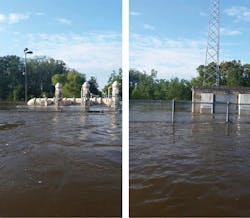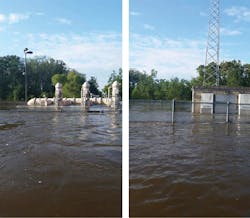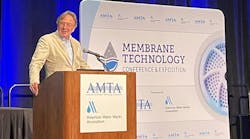An Engineer’s Responsibility to the Community
By Heinz P Bloch
Water pump failures in Fukushima, Japan, New Orleans, La., and Beaumont, Texas, were in the news often. All were critically important, and although they probably differed from each other in a number of ways, what these pumps had in common was that on various occasions and during an emergency, they were either unavailable, inundated, found to be inadequately maintained, unprotected, or incorrectly installed. To find the root cause for their failure, one would have to travel far back in the chain of events, and few people would know exactly what happened. Many lawyers would be involved in assigning blame, and chances are that for years they would talk about these events both in and out of courts of law.
Pumps flooded by Hurricane Harvey disrupted the water supply to more than 100,000 people in Beaumont, Texas. Photos: Beaumont Police Department
Acts of God
The legal profession calls some events “Acts of God” for reasons that have much to do with legal definitions and little to do with plain common sense. Common sense tells us that, as of today, higher factors of safety must be built into critical systems. These factors of safety must use a new rationale, as whatever rationale has been used in the past has proved deficient beyond any doubt.
The factor of safety of the systems involved in each one of these events was shown to be less than 1. As such, we will find at the end of the chain a human making an erroneous decision or perhaps not making any decision in the first place. Humans, not God, elected to build entire subdivisions on land that was deemed uninhabitable for hundreds of years before someone decided to issue permits, or to put dimensions to a drainage ditch design, or to opt against adding a drain pipe extension to a city street when — in 2008 — it was reconfigured from a cul-de-sac to a through-street.
Humans decided to call it an “Act of God” when man-made sheet piling didn’t run deep enough, or when an incorrect assessment was made of soil stability below the levies in one of America’s most beautiful cities in 2005. Simply put, sheet piling and soil issues caused the barriers and levies to be inadequate. Taken together, these human-induced errors and omissions allowed a 21-foot elevation lake to spill into adjacent neighborhoods with an average elevation of 6 feet below sea level.
I firmly believe a true professional must speak up for the truth. Professionals knowledgeable in civil and mechanical engineering can make a powerful case for facts and must share them with the public. Explaining science to the layperson is a task assigned to the reliability profession.
As we give some thought to the facts in evidence, we bring ourselves to conclude that “the hurricane did it,” a statement rooted in superficial thinking by an uninformed group of people. While pumps may have played a minor role on that particular occasion, they had often been unavailable in recent years, probably due to lack of spares and for other reasons. Until someone reassesses the situation, these pumps and their installations are a concern.
Beware of 500-Year Floods
After four major floods in 10 years, one may just have to abandon the notion that 500-year floods happen only once every 500 years, and that rivers never rise high enough to inundate and disable critical equipment built to standards that have been neither updated nor revised in many decades
Suppose a 1 percent increase in property taxes would make it 10 times less likely for the community to again become uninhabitable. It is reasonable to assume that a knowledgeable individual could have explained to the residents and homeowners of certain cities and neighborhoods that the increase — appropriately spent — could ward off future calamities. One could also make the point that it’s now high time to be proactive in all safety matters. Explaining these facts to a sensible citizenry may nudge taxpayers to agree with our reasoning.
I don’t believe in conspiracies, sabotage, or other far-fetched scenarios being responsible for the various and sundry pump issues. I fear there will again be much indifference and that the message will be shrugged off as hindsight, which is indeed 20/20. Detractors have labeled editorial of the type you’re reading now as “polemic,” which is a hostile attack on someone else’s thinking. Still, I think the entire issue boils down to professionalism.
I firmly believe a true professional must speak up for the truth. Professionals knowledgeable in civil and mechanical engineering can make a powerful case for facts and must share them with the public. Explaining science to the layperson is a task assigned to the reliability profession and being familiar with the Engineers’ Creed will be helpful.
The Engineers’ Creed
In 1954 the National Society of Professional Engineers adopted The Engineers’ Creed. Allow me to share it with all who can reason on the clarity of its meaning:
As a Professional Engineer, I dedicate my professional knowledge and skill to the advancement and betterment of human welfare. I pledge:
• To give the utmost of performance
• To participate in none but honest enterprise
• To live and work according to the laws of man and the highest standards of professional conduct
• To place service before profit, the honor and standing of the profession before personal advantage, and the public welfare above all other considerations.
In humility and with need for Divine Guidance, I make this pledge.
Hopefully, we will all finally act in accordance with the Engineers’ Creed. And while we may not be able to change the senseless, the greedy and those unwilling to listen, we can at least appeal and broadcast the truth to those who are able and willing to respond. Let’s start by lobbying for realistic safety factors in critical systems. For professional engineers to simply shrug their shoulders runs counter to the creed that was formulated 63 years ago. WW
About the Author: Heinz P. Bloch makes his home in Westminster, Colo., and Houston, Texas. His professional career commenced in 1962 and included long-term assignments as Exxon Chemical’s Regional Machinery Specialist for the United States. He has authored or co-written over 700 publications, among them 20 comprehensive books on practical machinery management, failure analysis, failure avoidance, compressors, steam turbines, pumps, oil mist lubrication and practical lubrication for industry. Bloch holds both bachelor’s and master’s degrees (cum laude) in mechanical engineering. He is an ASME Life Fellow and maintains lifetime registration as a Professional Engineer in New Jersey.




